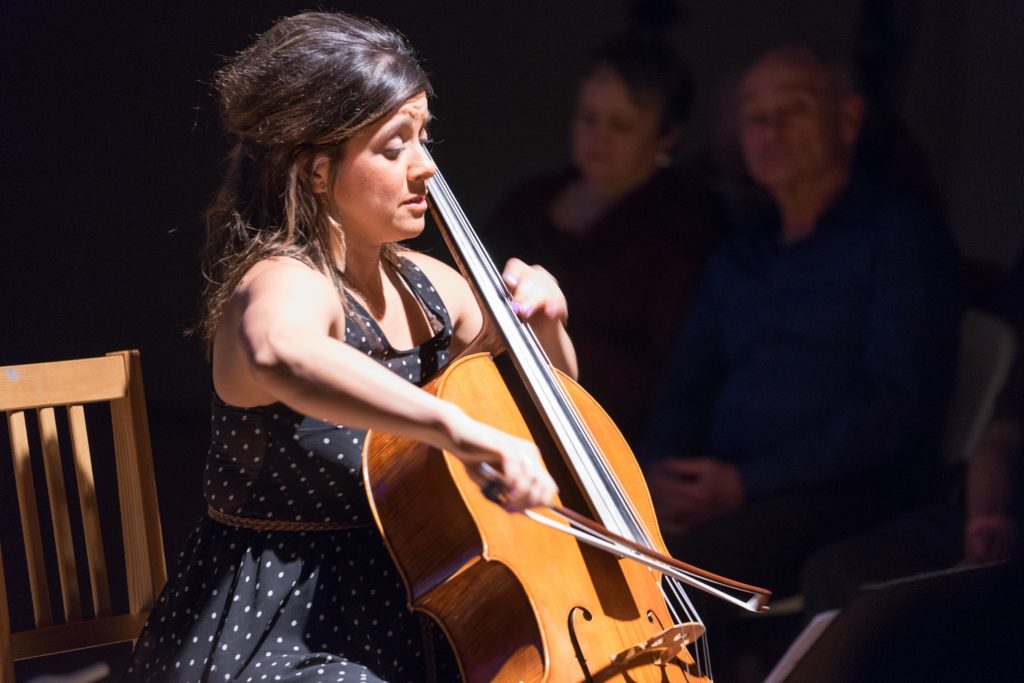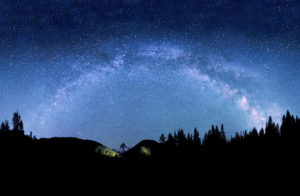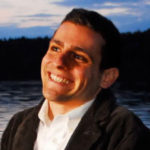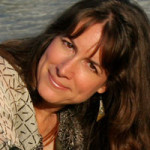
Cellist Marilyn DeOliveira performs Christina Rusnak’s Glacier Blue. Photo courtesy Jacob Wade and Third Angle New Music.
Editor’s Note: Composer Christina Rusnak, a member of the Landscape Music Composers Network, writes her third illuminating essay for Landscape Music.

Christina Rusnak
While composing a recent commission for the new music ensemble Third Angle, I began to consider how the requirements and aesthetics of the commissioning organization impact the creation of landscape music. In a pre-concert talk I attended a few years ago, Steven Stucky pointed out that frames are a good thing; otherwise, our choices would be limitless. For most of my years as an emerging composer, however, I worked without frames—except for the contexts of landscapes themselves. As I hiked, researched, and experienced the various facets of a particular place, the scaffolding of a piece would emerge.
Third Angle provided explicit and implicit parameters that encouraged (and/or pushed) me to create work beyond my comfort zone, while still allowing for a breadth of creative choices on my part. Without their 12-15 minute time frame for a solo instrument, I would not have created a work of that length with contrasting sections. The most exciting challenge was fusing the experimental aesthetic of the organization with the essence of Glacier National Park, the virtuosic capabilities of the performer, and my own natural lyricism. The resulting three-movement cello solo, Glacier Blue, focuses on the color and timbre that tie the mountains, sky, and water together.

Photo © John Ashley.
I had worried that a commission for landscape music could compromise the integrity of the sense of place I was composing about and advocating for. In actuality, the process encouraged me to examine the elements of the landscape on a deeper level and provided me with the means to push my creativity further. In light of my involvement with Third Angle, I asked others in the Landscape Music Composers Network to relate their commissioning experiences.

Oliver Caplan
Oliver Caplan served as Composer-in-Residence for the Firebrand Concert series in Middlesex County Massachusetts over the 2012-2013 season. Firebrand asked him to compose To the Sea, a piece about the “Bike to the Sea” trail, a 10-mile rails-to-trails reclamation project providing car free access to the beaches and connecting people to the landscape. The trail is part of the East Coast Greenway, which plans to connect nearly 3,000 miles of trail from Calais Maine, to Key West Florida.
Without the commission, Caplan states, he would never have composed a string quartet about this place. He met with community members to understand their connection to the trail and to landscape. He writes, “Like tributaries that converge to form rivers that flow into the sea, communities are built by individuals who collaborate to achieve something greater than the sum of their parts. The “Bike to the Sea,” a rails-to-trails project [was] designed to reclaim connections with the natural environment and link the communities of Malden, Everett, Revere and Saugus with the Lynn waterfront.”

Alex Shapiro
Composer Alex Shapiro’s life is intertwined with facets of her landscape and her community. She states, “Music doesn’t have to be experienced as an element separate from the rest of our daily lives. It’s as much part of our world as the ground on which we walk.” Composing a piece commissioned by Patrick March Middle School was the perfect opportunity for Shapiro to make this point.
In meeting with the school’s 7th Grade Band in Sun Prairie Wisconsin, Shapiro asked the students to “venture out,” find some rocks, and record various sounds the rocks can produce. Concurrently, the band director invited a geologist from Wisconsin’s Geological and Natural History Survey to talk to the kids in the band. She displayed a 3D map of Wisconsin’s terrain and provided the students with insights about the glacial activity that transformed their local landscape. They created videos that intersected their newly acquired geological knowledge with the sounds of the rocks they recorded.
The resulting band piece assimilates music for band that Shapiro composed, an audio accompaniment that integrates the sounds that the students created, and live sounds of rocks that the students will also play. The commission and creation of ROCK MUSIC allowed Shapiro to reinterpret the preconceived definition of band music. This “geo-electroacoustic piece…crawls, melts and scrapes over a sonic landscape…much as the glaciers carved the world we know.”
Responding to or seeking out commissions enables composers to create music for new landscapes and/or stimulates us to respond in new ways that stretch our creative muscles. These endeavors are positive because we collaborate with others to broaden the scope of perspective beyond our own—to create works that can be more inclusive.
Christina Rusnak is a composer and member of the Landscape Music Composers Network.

Pingback: Landscape Music Essay Features Oliver’s Work